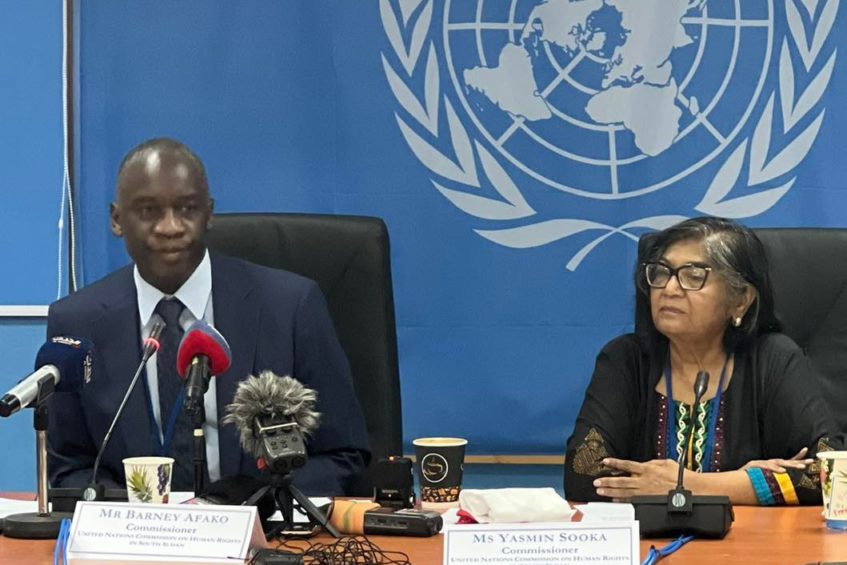
Yasmin Sooka [Right], the chairperson of the UN Human Rights Commission, and Barney Afako [Left], UN Human Rights Commissioner during a press briefing in Juba - credit |Atem Jenifer/Eye Radio | February 11, 2022
The UN Human Rights Commission has warned of a return to violence if the peace parties fail to expedite full implementation of the 2018 peace deal.
The 12-member UN Commission on Human Rights issued the statement today [Friday] in Juba after concluding their ninth visit to the country, which took place from 7 to 12 February.
According to commissioners, they have met with all South Sudanese actors including senior government ministers, civil society, victim’s groups, Troika, UN agencies and entities monitoring the peace agreement.
Of the meetings, the commissioners said, they found a consensus among key stakeholders that while some progress have been made in implementing the peace deal, critical elements are yet to be addressed.
These include the security sector reform, constitutional and electoral reform, and transitional justice.
The body said the lack of progress including the unification, graduation and deployment of the armed forces contributed to the persistent insecurity and impunity against human rights violations.
In what they describe as South Sudan at a tipping point, the commissioners said the pursuit of elections runs the risk of fueling violence and polarization.
This, they warned, unless the requite institutions, constitutional and electoral laws including logistic arrangements are put first in place.
The UN rights commissioner emphasized that having a permanent constitution in place will offer a tool to address the causes of persistent conflict and insecurity in South Sudan.
But the move to pass the constitution-making process bill to enable the actual constitution making process kick off has been delayed.
Yasmin Sooka, the Chairperson of the UN Human Rights Commission said the ongoing violence in Jonglei and other parts of the country are indicators of lack of political will among the leaders to implement the peace agreement.
“The kind of violence that took place last year and is continuing in Jonglei and other states in the country, one has to ask what is fueling this? This is no longer just about cattle raiding, and grievances,” the chairperson of the UN Human Rights Commission said.
“The kind of weapons being flown and handed over to the people, one has to ask who benefits from that violence? That is beside the question of the opposition forces, the holdout groups, the signing of agreements with people with fake features in violation of the revitalized peace agreement.
“When we put all those factors together that are part of the conflicts into a process both into constitution and elections and without that to be very frank, you could revert back to violence.”
“It will be critical for South Sudan’s regional partners and guarantors of the peace process to pay heightened attention to the situation in the country and work to help the realization of the peace aspirations held by its people,” concluded Sooka.
For his part, UN Human Rights Commissioner, Barney Afako has appealed to the leaders to get together and advance the course of peace and stability in South Sudan.
“It’s important for the leadership of this country to come together to make sure that this transition that will come to a conclusion will advance the interest of people of South Sudan and stability in this country,” Commissioner Barney Afako said.
“South Sudan is at a tipping point. The pursuit of elections runs the serious risk of fueling violence and polarization if the requisite institutions, constitutional and electoral laws as well as logistic arrangements are not first in place.
“It is also important to look beyond the electoral moment and ask what political system people would be voting for, particularly given the delays to develop a constitution on which elections would be based.”
The UN Rights Commission recommended that one key task would be the mapping of electoral constituencies.
It says a bigger question looms regarding the system that people will be voting for, given the absence of a permanent constitution, and the present lack of clarity on how the sequencing of elections and constitution-making are to intersect.
The Commissioner says Chapter 6 of the Revitalized Agreement provides for the development of a permanent constitution, upon which the future political system will be based.
It says if done well, the constitution-making process offers a tool to address root causes of persistent conflict and insecurity in South Sudan.
However, it warned that if handled poorly, it may embed existing grievances and sow seeds of future conflict.
They say, although a Bill has been drafted that lays out a consultative process, it has not yet passed, and so constitution-making has not yet started.
It also added that timetables remain unclear despite the transitional period being scheduled to end next February 2023.
The UN Commission on Human Rights will present its next report on the human rights situation in South Sudan to the UN Human Rights Council in March 2022, in Geneva.
The peace parties are yet to comment on the statements.
Support Eye Radio, the first independent radio broadcaster of news, information & entertainment in South Sudan.
Make a monthly or a one off contribution.
Copyright 2024. All rights reserved. Eye Radio is a product of Eye Media Limited.